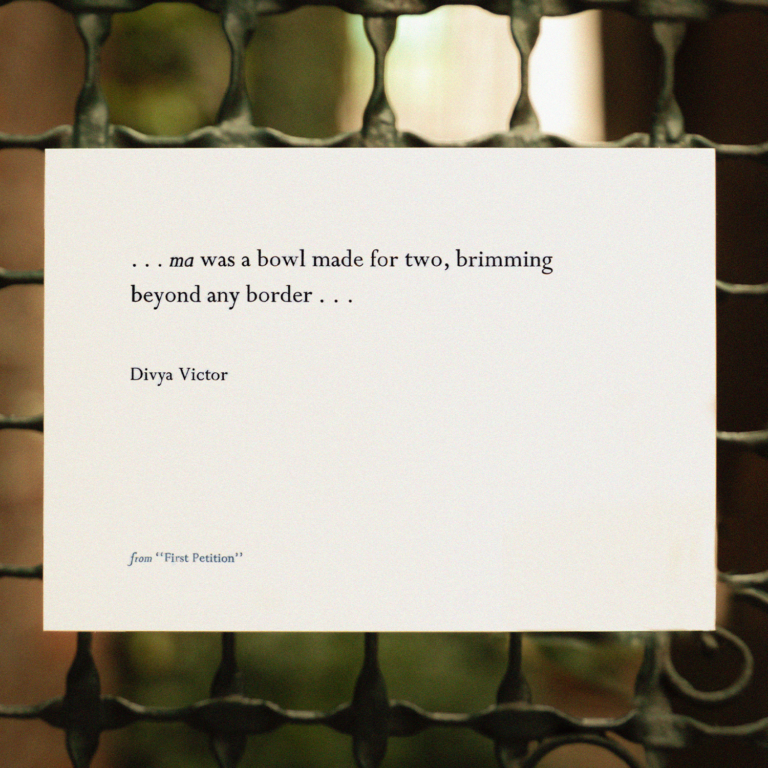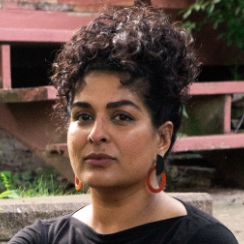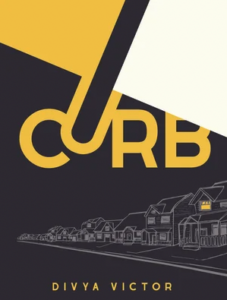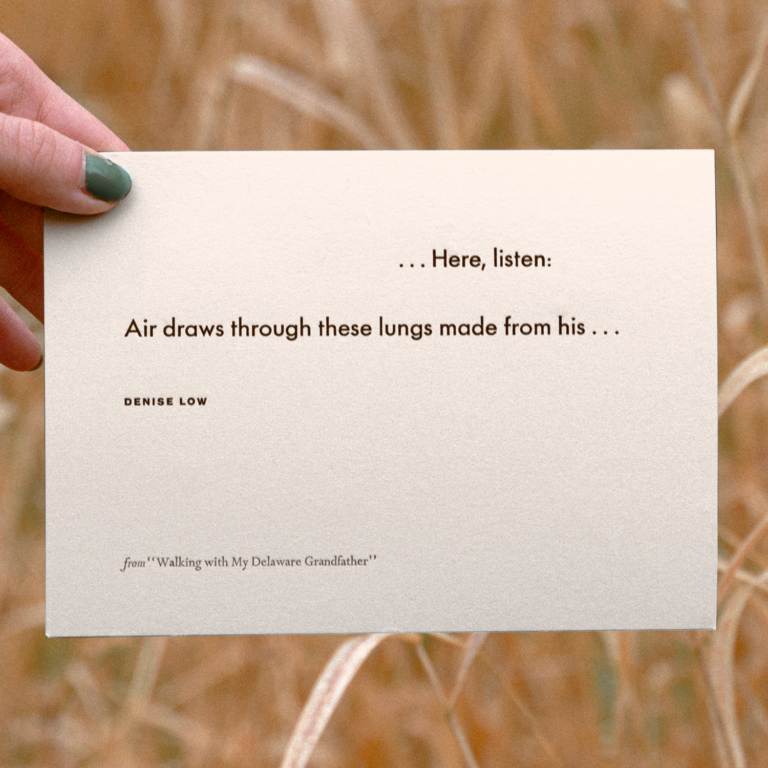Divya Victor
First Petition
A seven-year poem: from the start of the process to bring a mother to live in the US to the time she walks through the gate.
We’re pleased to offer Divya Victor’s poem, and invite you to sign up here for the latest from Poetry Unbound.

Letterpress print by Myrna Keliher. Photography by Lucero Torres. © All Rights Reserved.
Guest

Divya Victor is the author of Curb (Nightboat Books, winner of PEN America Open Book Award and the Kinglsey Tufts Poetry Award); Kith (Fence Books/ Book*hug); Scheingleichheit: Drei Essays (Merve Verlag); Natural Subjects (Trembling Pillow), Unsub (Insert Blanc), Things To Do With Your Mouth (Les Figues). She is currently an Associate Professor of English at Michigan State University.
Transcript
Transcription by Heather Wang
Pádraig Ó Tuama: My name is Pádraig Ó Tuama, and some days it can feel like all I’m doing is filling in forms: forms to apply for something, forms for something to be shipped to me, forms for anything at all; forms about visas, forms about change. And I think so many of us who fill in forms regularly find ways within which we say, Oh, I don’t fit in here. There’s all those little boxes to try to fit in details, and you’re compromising. You’re putting something as huge as your life into small boxes that somebody has pre-assigned. Some forms are a matter of life and death for people. Some forms will change a person’s life, change a person’s family, change who they are and where they are. And these forms so rarely honor the brilliance and the complexity of the human condition.
[music: “Praise the Rain” by Gautam Srikishan]
“First Petition” by Divya Victor:
“it is a Thursday
& no one out on this long street
looks like your mother
so you go home
wrap yourself in Form I-130
knit a nest with a ballpoint pen
limn your ken inside a placeholder
smooth your limbs into a square
to beg for a place for your first space
her
write a name into the petition, in thin
improbable syllables
—no one calls her by this name, in the elsewhere
because they know her fish-market haggle:
purse tucked at the waist, sari pleats pulsing like flushed gills
—no one, except the men
who will ask her ma’am can you name two national holidays?
& ma’am who lived in America before the Europeans arrived?
so you plan it out, letter by letter in letters,
your mouth cupped to her cataracts
ma, just listen & answer the men who ask
how she came to know you, if she intends to remain here,
& sir, for how long have you known
that ma was a bowl made for two, brimming
beyond any border, red
as the arrival of her face seven years later,
a paper apparition drawn closer & closer to you by a queue
unknotting at a frayed horizon
in an airport
when
it is a Thursday
& suddenly she walks
through the passport photograph
you once stapled at the edge of a petition
to anchor her womb
to your migrating heart”
[music: “At Dusk” by Gautam Srikishan]
So this is a poem sandwiched between two Thursdays, and the Thursdays are seven years apart. The first Thursday is a Thursday when the speaker — maybe it’s Divya Victor, maybe it’s a relative, maybe it’s an invented speaker — is on the street in America, and no one looks like their mother. And then the last part of the poem is another Thursday seven years later, where the mother finally arrives at an American airport, having been granted a visa through a complicated process that includes this form I-130, filled with questions. And then those questions would lead into an interview, where questions like “can you name two national holidays?” or “who lived in America before the Europeans arrived?” are part of it. And not only questions of knowledge, but also questions about who’s sponsoring you, how well do you know them, how long have you known them — which seem bewildering, when your sponsor is your daughter. And you can hear the person who understands the immigration system trying to coach her mother, to say, Don’t shout at them that this is a stupid question. Don’t haggle with them, even though you’re brilliant at haggling. Just say, She’s my daughter, so I’ve known her her whole life, rather than saying, Ask me a better question.
In between these two Thursdays in the poem, seven years occurs. And in those seven years, there’s work and extraordinary immigration administration and writing and filling in little boxes and legalities and formalities and learning how to represent love and to reduce love, really, into the kind of questions that are either asked in an interview or the kind of tiny spaces with differentiated boxes that those forms give you. She’s saying that none of these tiny ways that you have to represent your relationship on an immigration form will ever be adequate to the love that you have, but you still need to be able to do it.
[music: “The House You Wake In” by Gautam Srikishan]
The form that’s mentioned, form I-130, is called the Petition for an Alien Relative. And the documents of immigration almost become a stand-in for personhood in this poem. Bureaucracy is a very flat language. You’ve got to squeeze your name into boxes, or tick boxes for yes or no, or make awkward choices about how to abbreviate your name, if your name is too long to fit into the boxes that are provided, or use your formal name even if nobody calls you that. And Divya Victor challenges this flatness, the depersonalized ways within which language can not-bear witness to humanity. So she uses these amazing verbs: you “wrap” yourself in form I-130, and you “knit a nest with a ballpoint pen” and “limn your ken inside a placeholder” and “smooth your limbs into a square.”
“Limn” comes from the same word as “illuminate,” and so it’s a certain sense of saying “shine your light on,” or even, “draw your ken,” your people, your known ones. Some of these verbs might be associated with motherhood, in a way that would be categorizing. But she makes them work in all kinds of formal, bureaucratic, public, political, fighting for presence with each other, ways in this magnificent poem.
[music: “Algea Trio” by Blue Dot Sessions]
Official forms are always saying: Fill your name in, in the space here. Give your answer in the space provided. And one of the things that Divya Victor does in this poem is to really challenge the idea of space: she says, “to beg for a place for your first space / her.” And one of the things that can mean is the womb in which she grew. But it can mean so many other things, too. She’s elevating what it is that forms limit. The speaker in this poem is continually reminding herself that all of this is for love, and you’re just doing this to get through the process until, some Thursday in the future, you can wait at the airport to welcome your mother.
The mother in this poem does not fit into categories. Nobody calls her by the name that she is formally named as, and then people know her because of “her fish-market haggle.” And there’s that great image of the “purse tucked at the waist” and “sari pleats pulsing like flushed gills.” She’s fluent in commerce and in markets and in haggling for a better price. And fish and “flushed gills” have a correspondence with each other. But also, this is an embodied image: “sari pleats pulsing like flushed gills,” taking up all the space they take; her language going in all kinds of directions, getting people to change their mind. This embodied imagination of the person that the speaker in the poem is trying to bring to America does not fit into any box.
[music: “The Spills” by Blue Dot Sessions]
This poem is in a long echo of so many global poems that concern themselves with the name of something. And it’s the name of the mother, here. First of all, she’s referred to as: “no one out on this long street / looks like your mother.” And then later on, she’s called “ma’am,” and even though that’s formal and polite, it isn’t enough, because Divya Victor says that “ma” is “a bowl made for two, brimming / beyond any border.” This person brims beyond the container that she’s needing to be fit into in order to live in the United States with her daughter.
This poem does offer a resolve, because the mother, at the end of the poem, through that process, has squeezed through those little tick-boxes and walks out again. She’s spotted in a queue, coming through at the airport, and she who’s been in paper is suddenly in person. She who has been belittled, through a process of having to write her name, is suddenly body. And the poem elevates to a kind of music:
“in an airport
when
it is a Thursday
& suddenly she walks
through the passport photograph
you once stapled at the edge of a petition
to anchor her womb
to your migrating heart”
“Womb,” “heart,” “migrating,” “anchor” — these powerful descriptors that are happening are echoing not just the relationship of the speaker with a mother who’s finally come through an airport, but echoing the experience of migration.
Divya Victor, when she was writing about this poem, said that “[f]illing out immigration and citizenship documents and forms was the first kind of collaborative writing we did as a family.” And so, within the context of this, it makes me think that there is a bearing witness to the widespread experience of so many people and their families: that forms for various countries, for various visas, for various passports, for various permissions to be allowed for a visit — a longer visit, a shorter visit, a visit for a funeral, a visit for a birth — so many of these documents are on the kitchen tables of people who are trying to figure out, How can I find a way to be allowed to bear witness to my love, by visiting somebody who I love?
[music: “At Dusk” by Gautam Srikishan]
“First Petition” by Divya Victor
“it is a Thursday
& no one out on this long street
looks like your mother
so you go home
wrap yourself in Form I-130
knit a nest with a ballpoint pen
limn your ken inside a placeholder
smooth your limbs into a square
to beg for a place for your first space
her
write a name into the petition, in thin
improbable syllables
—no one calls her by this name, in the elsewhere
because they know her fish-market haggle:
purse tucked at the waist, sari pleats pulsing like flushed gills
—no one, except the men
who will ask her ma’am can you name two national holidays?
& ma’am who lived in America before the Europeans arrived?
so you plan it out, letter by letter in letters,
your mouth cupped to her cataracts
ma, just listen & answer the men who ask
how she came to know you, if she intends to remain here,
& sir, for how long have you known
that ma was a bowl made for two, brimming
beyond any border, red
as the arrival of her face seven years later,
a paper apparition drawn closer & closer to you by a queue
unknotting at a frayed horizon
in an airport
when
it is a Thursday
& suddenly she walks
through the passport photograph
you once stapled at the edge of a petition
to anchor her womb
to your migrating heart”
[music: “Praise the Rain” by Gautam Srikishan]
Chris Heagle: “First Petition” comes from Divya Victor’s book Curb. Thank you to Nightboat Books, who gave us permission to use Divya’s poem. Read it on our website, at onbeing.org.
[music: “Praise the Rain” by Gautam Srikishan]
Poetry Unbound is: Gautam Srikishan, Erin Colasacco, Eddie Gonzalez, Lilian Vo, Lucas Johnson, and me, Chris Heagle.
Our music is composed and provided by Gautam Srikishan and Blue Dot Sessions.
This podcast is produced by On Being Studios, which is located on Dakota land. You may enjoy our other podcasts: On Being with Krista Tippett, Becoming Wise, and This Movie Changed Me. Find those wherever you’d like to listen, or visit us at onbeing.org to find out more.
Books & Music
Recommended Reading
The On Being Project is an affiliate partner of Bookshop.org and Amazon.com. Any earnings we receive through these affiliate partnerships go into directly supporting The On Being Project.









